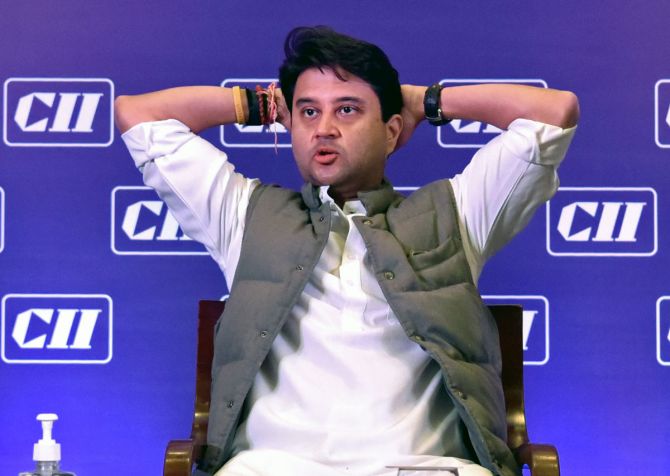'My job is to provide people with a bouquet of options they can choose from.'

Just days after telecom companies approached the government protesting against the regulator's recommmedations on spectrum pricing for satellite broadband, Telecom Minister Jyotiraditya Scindia questioned the telcos' logic of level-playing field between two different technologies -- satellite and terrestrial.
In an interview at his office in Sanchar Bhawan, the minister spoke to Subhayan Chakraborty and Nivedita Mookerji/Business Standard on wide-ranging issues including duopoly concerns, relief for stressed telcos, road ahead for MTNL and BSNL, rural connectivity and more.
What do you see as the biggest achievement in the telecom sector?
The telecom sector is fundamentally one of the most important underpinnings of India's resurgency and growth story.
During the last 10 years, there's been an exponential, metamorphic change in the promulgation, execution and throughput of India's digital highway.
It has plugged India into the world and has also brought the world to India.
A country that hardly had any digital transactions earlier is now responsible for 46 per cent of the world's digital transactions owing to the Unified Payments Interface and Direct Benefit Transfers.
This has become the envy of the globe. While penetration has grown multifold, the economies of scale have resulted in (tariff) costs falling exponentially.
Ten years ago, calling cost was 50 paise a minute, now it is 0.03 paise a minute.
Data used to cost Rs 287 per GB 10 years ago, today it's Rs 9 a GB or $0.11. The world average is $2.49 per GB.
But isn't low tariff a problem for the telecom sector in terms of financial stress?
I'm not a market maker. My job is not to be a regulator, it is to be a facilitator. My job is to provide people with a bouquet of options they can choose from.
It is their right as a customer to decide which service to go with. The telecom industry across the world is saturated, growing in single digits, if at all.
Most companies are reluctant to put in any more capital expenditure.
It is only in India that the telecom industry contributes 7.5 per cent of the GDP (gross domestic product), and is growing at a compounded annual growth rate of 12-13 per cent on a decadal basis.
At least over the third and fourth quarter of FY25 (October-March), the telecom industry is making profits.
The industry is putting in Rs 4 trillion as capex for 5G. We've had the fastest 5G roll out in the world.
Why do you think the industry is still asking for relief and sops?
It is the responsibility of every company to manage their profit and loss, and their balance sheet.
I have great respect for all of our telcos and I think they've done yeoman service in pushing forward the growth of the digital landscape in India.
If and when they want to seek counsel and assistance, they have every right to come to the government.
If and when they do so, the government will take a call. At this point of time, the Supreme Court has taken a call and we have to stand by whatever the Supreme Court has said.
Is Vodafone Idea (Vi) in conversation with the government right now on getting relief linked to AGR (adjusted gross revenue) dues, after the Supreme Court rejected the plea?
Vi has been in conversation with the government for a long period and we've also taken equity in Vodafone.
We have converted Rs 36,000 crore of our dues into equity. We are now at 49 per cent holding in Vi, and we do not intend to increase that equity.
What other form of relief can the government give the telco?
That's not something that I can discuss with you at this point.
What about Airtel? It had also approached the government for conversion of dues into equity.
Each application will be studied by the department, and a decision will be taken. It is the right of every party to approach the government, and it is the right of the government to take a decision.
So, no decision has been taken on Airtel as well?
No.
Is duopoly situation in the telecom space a concern for the government?
My job is to provide multiple players, whether it's in satellite, or broadband, or internet service providers or telcos.
What is the roadmap ahead for BSNL and MTNL?
MTNL has transferred all its operational responsibilities to BSNL as of January 1. As we speak, we are building out the 4G BTS (base transceiver station) in Mumbai and Delhi for both.
What will be left in MTNL is its debt. We are going to speak with the banks in terms of doing some reorganisation of that debt. Land assets within MTNL will be monetised.
Telcos have protested recommendations of the Telecom Regulatory Authority of India (Trai) on the pricing of satellite spectrum, calling it anti-level playing field. What is your take ?
Terrestrial and satellite communication are very different technologies.
How can you compare an industry that has 4.1 million customers with one which has 1.2 billion customers in India alone?
But operators have said next generation non-geostationary satellite orbit (NGSO) satellites can now directly substitute and compete with terrestrial fixed, and mobile broadband services.
Are you telling me that technology is static? I have always maintained that satellite technology is complementary.
It is my job to provide alternatives to all my customers, and I will do that.
Trai has come out with its recommendations. Now Department of Telecom will study them.
They will come to a common conclusion, and based on that we will assign spectrum administratively.
With the advent of satellite based internet, should we expect a change in the strategy for Bharatnet?
The width of the pipe with regard to optical fiber cables and broadband, can't be compared to the mobile broadband or satellite.
Across the world, fixed broadband has exponentially increased penetration rates.
Our penetration rates in India are still very, very low. To take in huge volumes of data, we require low latency, and a wider pipe which this can't provide us with.
It has to be through broadband, for which you have to wire up the country.
Under Prime Minister Narendra Modi's leadership, we've got the largest public sector investment in the world in broadband at $16.9 billion.
For the first time globally, we have a model which not only takes into account capital expenditure but also operational expenditure.
How many gram panchayats are being connected through Bharatnet?
Today we have 214,000 gram panchayats covered. The balance will be around 56,000.
Beyond gram panchayats, how will individual homes be connected by Bhartnet?
The first level is 100 per cent connectivity to gram panchayats. Then 380,000 villages will also be connected on demand.
We will then have Bharatnet Udyamis, the entrepreneurs who will take the connection from the receiver at the panchayat, giving last mile connection on a remunerative basis to consumers.
Feature Presentation: Aslam Hunani/Rediff








